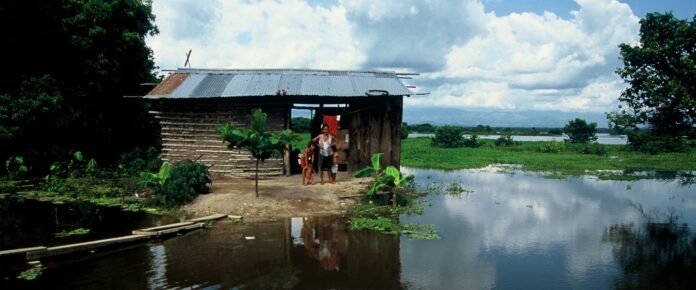By Gajendra Singh Shekhawat
The genesis of climate change can be traced to an economic principle called “Tragedy of Commons”, which says that when individuals have access to a common resource, they act in their own interest, make decisions selfishly with scant regards to their impact on others. Earth is our common resource, and this humane tendency has driven us into this menace known as climate change. Our Honorable Prime Minister, Shri Narendra Modi highlighted this when he spoke at COP26, held at Glasgow in 2021. One aspect that he expounded has become the buzz word in nudging people towards sustainable behavior, the concept of LiFE; “Life style for environment”. Water is at the heart of mission LiFE.
Water is at the heart of mission LiFE “Life Style For Environment”
When India assumed the Presidency of G20 on 1st December, 2022, we shared the vision of ‘One Earth, One Family, One Future’ and with the motto of ‘Vasudhaiva Kutumbakam’. If the world has to emerge victorious from the scourge of climate change, then G20 countries have to do the heavy lifting as 80% of world’s emissions is caused by these countries. While the gambit of Climate change is vast, I would like to draw your attention towards one aspect in particular, i.e., Water resources management.
India is committed to strengthen cooperation among G20 member countries in water resources development and management through sharing technical experiences, best practices and usage of state-of-the-art tools and technology. India believes that water has to be at the centre of our development paradigm, with partnerships that make WATER everyone’s business.
The Second Environment and Climate Sustainability Working Group (ECSWG) meeting organized by the Ministry of Environment, Forest and Climate Change held in Gandhinagar during March 27-29, 2023 included a side event on the theme of Water Resources Management led by the Ministry of Jal Shakti. With countries gathered to reiterate their commitments towards water security, India reaffirmed that its priorities, policy and actions are organically linked to achieving the targets set by the SDGs. Many Presentations were made on diverse themes of Integrated & Sustainable Use of Water Resources /Ecosystem Management, Waterbody Restoration, River Rejuvenation, Rainwater Management, etc will definitely be of immense value for all G20 members.
Under visionary leadership of Modiji, Government of India has taken several initiatives to improve the quality of life of its 1.4 billion people. The integrated ministry of Jal Shakti was formed to have greater synergy and coherence to water management in the country.
All our programmes and efforts are aligned for such coherent holistic water management in the country. Through Jal Jeevan Mission, world’s biggest drinking water supply program to provide drinking water through tap connection to 160 million households, today more than 116 million, i.e., 60% of Households have been provided with a tap water connection. According to recent studies availability of safe drinking water shall save the lives of 1.36 Lakh children under the age of five. Our other flagship campaign, Swachh Bharat Abhiyan made India 100% open defecation free by the construction of more than 100 million toilets which saved the lives of 3 Lakh children according to a WHO Study. Now we are moving towards “Total Sanitation” by creating villages equipped with best Solid and Liquid Waste Management practices aimed towards ODF+. More than 1/3rd of all villages in India have become ODF+ today.
Under the flagship interventions of water management in the country that were shared Namami Gange Mission was shown as a model for holistic river rejuvenation through five modes – managing pollution, maintaining continuity in the river flow, improving people-river connect, conservation of river ecosystem and sustainable livelihood. Our efforts have been duly noted by United Nations which recognized us as one of the Top 10 World Restoration Flagships to Revive the Natural World.
India also shared the work done on Climate Resilient Infrastructure – Water Resource Development through Strategies for Climate Resilience including the Dam rehabilitation program to better manage critical water storage infrastructure and Participatory Ground Water Management – Involving communities for sustainable Groundwater Management.
In the G20 meeting, highest emphasis was given to the role of cooperation at all possible levels which is key in effective Water Resource Management. Secondly, the common understanding of water and groundwater and integrating principles of sustainable development in implementation of WRM is critical. Some facets of an integrated approach as deliberated are: Interventions in Monitoring and evaluation of water ecosystems, Strong legal and policy instruments and Technology, cooperation and joint research.
The delegation also visited the stepwell at Adalaj Vav to see the ancient water management practices of India. It was followed by a visit to the Sabarmati Siphon structure, a modern engineering marvel that showcased India’s capacity to design and execute challenging water infrastructure projects. The delegates also experienced Gujarat’s vibrant cultural traditions.
The 2nd ECSWG meeting is a critical step in fostering the efforts of the G20 countries, invitee countries, and international organizations towards a sustainable and resilient future. Under the leadership of our Prime Minister, the Ministry of Jal Shakti is committed to working with all stakeholders to drive outcomes in each of the priority areas to achieve this common purpose.
The writer Gajendra Singh Shekhawat is Union Minister for Jal Shakti
-PIB










